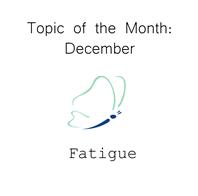Fatigue is one of the most common symptoms of lupus and it is often described by lupus patients as one of the most debilitating. For some people with lupus, fatigue can be their main symptom and it can even force them to stop working. The reason behind the extreme fatigue is not clear but a wide range of factors appear to play a role, including;
• Disease activity
• Pain
• Age
• Treatment
• Poor physical and mental health
In addition to these, other factors have also been shown to be related to lupus fatigue;
• Depression or anxiety
• Feelings of helplessness
• Lack of exercise
• Smoking
Before a physician can confirm that these factors are related to the fatigue they need to eliminate other possible ‘treatable’ causes of fatigue (such as anaemia, kidney failure or hypothyroidism).
Here are some tips which should help some people manage their fatigue;
• Pace yourself – alternate activities with rests throughout the day.
• Establish good sleeping patterns – Whilst everybody has different sleep requirements, at least 7 hours a night is recommended for lupus patients. It is also important to be aware that too much sleep isn’t healthy either as spending all day in bed can cause muscles to weaken, which can contribute to feelings of fatigue.
• Rest when needed – Napping during the day may be helpful and is sometimes needed, especially during a lupus flare. If you feel exhausted, make sure you rest rather than trying to fight through it.
• Plan ahead – for example, buy gifts throughout the year.
• Eat a healthy diet.
• Exercise regularly (if able). For more advice on exercise with lupus, see our previous article here - lupusuk.healthunlocked.com/...
• Stop smoking if you smoke.
• Prepare meals in advance.
Here’s a fantastic article from the Lupus Foundation of America, where lupus patients asked Dr Diane Kamen about lupus and fatigue - lupus.org/webmodules/webart...
We asked you to share your tips on how you manage your fatigue. Here’s what you said;
- “I found self-hypnosis really useful. I listened to it as I went to sleep. I have an iPhone so I downloaded specific apps but I’m sure there are CDs as well.”
- “I took a mixture of supplements from a list I found in the book, ‘Beating Chronic Fatigue’ by Dr Kristina Downing-Orr. The fatigue doesn’t affect me as much anymore.”
- “If employers allow, do what I do….have a nap when tiredness takes over. It helps me through the afternoon.”
- “My tip for those waking during the night regularly with pain comes via my consultant; don’t wait for the pain to start especially at night when you know it’s going to wake you up. Take pain-killers before you close your eyes and take pain meds regularly.”
- “To stop waking in the night due to pain, my doctor prescribed me with a slow releasing pain killer that works over twelve hours. I take one at 7am and the second at 7pm everyday – 24 hour pain relief.”
- “I have found that I am intolerant to wheat and sugar. If I eat them regularly, the pain and tiredness is so much worse. I have also read that sugar is bad for any type of pain.”
- “My main bit of advice is to PACE YOURSELF. Don’t do everything in one go. Do a job, sit down for a bit. Do another job, have a rest. If you are planning on going out, have a few hours rest before and after.”
- “Combatting fatigue? When I get around to housework, I do this first thing in the morning – a complete blast until I’m tired. After that I do short blasts when adverts are on my favourite TV programmes. It’s amazing how much you can do in five minutes, then you have a 15/20 minute rest before the next five minute blast. It works.”
- “A good Vitamin B complex will assist the body in energy production.”
- “The only thing that even helps is trying not to do too much, not to get stressed and to have very set routines (getting up, breaks, bed times etc.).”
***Please note that this article is written for informational purposes only and should not be a substitute for professional medical advice or treatment. Do not delay seeking or disregard medical advice based on information here. Always seek the advice of your local family physician or other qualified health professional before starting any new treatment or making any changes to existing treatment. It is also advisable to consult a medical professional before making any changes to diet or starting alternative remedies, which may interact with other medications.***
Thank you so much to everybody that submitted their tips and experiences for this month’s topic. We’re sorry if we weren't able to use your comment in the article.
If you try any advice from this article and find it helpful, we’d love to hear about it. Please also let us know if you have any other tips to share.
This is the last Topic of the Month blog for the time being. I’d like to thank everybody that submitted their tips and experiences throughout the year which helped to produce these articles. If you have a topic that wasn't covered in 2012 and you’d like some tips for coping with it, please post a question here on HealthUnlocked. We’ll be back soon with a new monthly blog for 2013.



